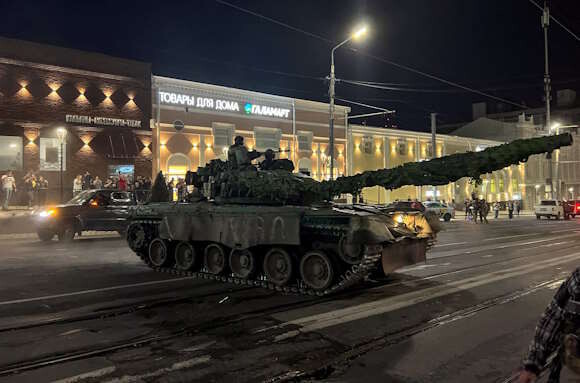Behind the ‘insurrection’ in Russia

Did Western intelligence have a hand in Prigozhin’s move and Moscow’s failure to pre-empt it?
Wagner Group chief Evgeny Prigozhin’s ‘betrayal’, as President Putin called it, serves to undermine the big victory achieved by the Russian army by repelling and foiling the Ukrainian counteroffensive that the US and NATO were banking on — a failure admitted by President Zelenskiy, who blamed the ‘slowness’ of the operation on their failure to provide Ukraine with enough advanced military equipment.
Putin, evidently surprised by this insurrection, delivered a brief speech in which he described it as ‘treason’ and a ‘stab in the back’ and vowed to crush it and punish the perpetrators. Prigozhin crossed a final red line when he called on Russian army officers and soldiers to mutiny and join his forces in a march on Moscow.
What is inexplicable is why Russian military intelligence failed to uncover this coup attempt and the intentions of its perpetrators early on instead of being taken in by their much-hyped achievements in eastern Ukraine, especially Bakhmut. Wagner is a mercenary outfit whose leader and his acolytes are motivated by money and riches. Their loyalty belongs to whoever pays the most. This is a serious intelligence failure that needs to be investigated and those responsible held to account, however close they may be to the president.
No less serious is the ease and speed with which the Wagner militia was allowed to advance, taking Rostov-on-Don and the military headquarters and airbase there without encountering resistance, and then marching on towards Moscow without being halted by airstrikes.
It is not unlikely that the US and other NATO states had a hand in this major military and intelligence breach. It might even have been the outcome of a carefully conceived covert plan. Ever since the first day the Russian army entered Ukraine, US and European media have been talking up the likelihood of a military coup to depose Putin due to disagreements within the army and the opposition of senior officers to the war. It is possible that these stories were circulated as cover for a secret operation to recruit the Wagner group and its boss to carry out their current move.
The insurrection by the Wagner Group, composed of mercenaries and released convicts, is the biggest challenge faced by Putin since he came to power in 1999. The big question now is how he will confront it while avoiding a bloodbath or a split in the military.
Prigozhin does not as he claims seek to topple Russia’s military chiefs in revenge for their behaviour towards him in Ukraine, but to topple Putin and his regime and take their place.
Prigozhin may dream of power, but all the signs indicate that his insurrection will most probably be quickly foiled. The 25,000 mercenaries he commands have only a fraction of the formidable capabilities of the regular Russian military.
Defence Minister Sergei Shoigu was right to resist pressure from Prigozhin to supply his troops with heavy equipment after their effective contribution to the fighting to capture Bakhmut. It was his decision, backed by Putin, to place all private military contractors including Wagner under army and defence ministry control from the first of July that triggered the crisis. Shoigu must have had his suspicions about the intentions of these groups, or some of them, and perhaps information about the possibility of them being penetrated by Western intelligence.
It is hard to see Putin emerging defeated from this grave crisis in the midst of the existential war being fought in Ukraine. These is no evidence of splits in the army or significant popular unrest. On the contrary, all of Russia’s top military, political, and spiritual leaders came out strongly in his support, as did heads of neighbouring countries (including Turkey’s Recep Tayyip Erdogan, repaying Putin’s backing during the failed 2016 military coup against him).
Putin said in his speech that he could forgive anything except treason. That implies that nooses await the necks of Prigozhin and his aides if his coup fails and he is captured alive.
https://www.raialyoum.com/behind-the-insurrection-in-russia/
 TheAltWorld
TheAltWorld 
John
I think this was all a ruse. Now he, Prigozhin, is banished to Belarus. And look tomorrow and see how far is Wagner from Kyiv. Just quietly walked into an ideal place to launch attacks on Kyiv and get behind the Spring Offeinsive in 72 hours. No one is getting panicky about this, just crowing as to how scared Putin must be, and he is weak and crumbling. And Putin said if they accept getting banished to Belarus he won’t charge anyone with treason all forgiven. And again – How far is Wagner now from Kyiv?